Deck 6: Applications of the Definite Integral
Question
Question
Question
Question
Question
Question
Question
Question
Question
Question
Question
Question
Question
Question
Question
Question
Question
Question
Question
Question
Question
Question
Question
Question
Question
Question
Question
Question
Question
Question
Question
Question
Question
Question
Question
Question
Question
Question
Question
Question
Question
Question
Question
Question
Question
Question
Question
Question
Question
Question
Question
Question
Question
Question
Question
Question
Question
Question
Question
Question
Question
Question
Question
Question
Question
Question
Question
Question
Question
Question
Question
Question
Question
Question
Question
Question
Question
Question
Question
Question

Unlock Deck
Sign up to unlock the cards in this deck!
Unlock Deck
Unlock Deck
1/113
Play
Full screen (f)
Deck 6: Applications of the Definite Integral
1
Magnetic hysteresis reflects the change in the magnetization, M, vs. applied field, H, when the applied field is increased then decreased in a cyclic fashion. The area between the M vs. H curves for increasing and decreasing H is related to the energy needed to take the material through the cycle. Use Simpson's rule on the M vs. H behavior listed in the table to calculate the area between the curves for the different directions of change of H. 
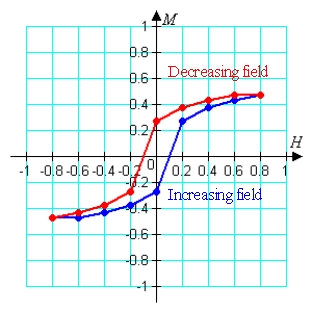
A) 0.210
B) 0.123
C) 0.083
D) 0.165


A) 0.210
B) 0.123
C) 0.083
D) 0.165
D
2
Sketch and estimate the area determined by the intersections of the following curves using the method of trapezoids. 
A)
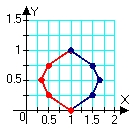
B)
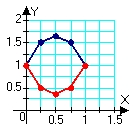
C)
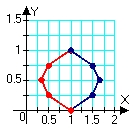
D)
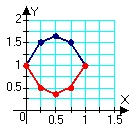

A)


B)


C)


D)


D
3
Find the area between the following curves on the given interval. 
A)
B)

C)
D)

A)

B)


C)

D)

A
4
Find the area of the region determined by the intersections of the curves. 

A) 10
B) 20
C)
D)


A) 10
B) 20
C)

D)


Unlock Deck
Unlock for access to all 113 flashcards in this deck.
Unlock Deck
k this deck
5
Find the area between the following curves on the given interval. 
A)
B)
C)
D)

A)

B)

C)

D)


Unlock Deck
Unlock for access to all 113 flashcards in this deck.
Unlock Deck
k this deck
6
Sketch and find the area of the region determined by the intersections of the curves. 




Unlock Deck
Unlock for access to all 113 flashcards in this deck.
Unlock Deck
k this deck
7
An electrical power supply, such as a battery, generates an electrical potential (voltage, V) which varies depending on how much current (i) it is delivering. The integral  represents the total power (energy per unit time) being given off by the battery when it is producing a current I. The useful electrical power, however, is just the product
represents the total power (energy per unit time) being given off by the battery when it is producing a current I. The useful electrical power, however, is just the product  . The difference between the total and the electrical power represents power that is wasted (and that accumulates as heat). Consider a hypothetical battery with a voltage vs. current curve described by the equation
. The difference between the total and the electrical power represents power that is wasted (and that accumulates as heat). Consider a hypothetical battery with a voltage vs. current curve described by the equation  . If the battery is producing a current of 4 amperes, how much electrical power is being produced, and how much power is being wasted?
. If the battery is producing a current of 4 amperes, how much electrical power is being produced, and how much power is being wasted?
A)
B)
C)
D)
 represents the total power (energy per unit time) being given off by the battery when it is producing a current I. The useful electrical power, however, is just the product
represents the total power (energy per unit time) being given off by the battery when it is producing a current I. The useful electrical power, however, is just the product  . The difference between the total and the electrical power represents power that is wasted (and that accumulates as heat). Consider a hypothetical battery with a voltage vs. current curve described by the equation
. The difference between the total and the electrical power represents power that is wasted (and that accumulates as heat). Consider a hypothetical battery with a voltage vs. current curve described by the equation  . If the battery is producing a current of 4 amperes, how much electrical power is being produced, and how much power is being wasted?
. If the battery is producing a current of 4 amperes, how much electrical power is being produced, and how much power is being wasted?A)

B)

C)

D)


Unlock Deck
Unlock for access to all 113 flashcards in this deck.
Unlock Deck
k this deck
8
Find the volume of the solid with cross-sectional area  extending over the range
extending over the range  .
.
A)
B)
C)
D)
 extending over the range
extending over the range  .
.A)

B)

C)

D)


Unlock Deck
Unlock for access to all 113 flashcards in this deck.
Unlock Deck
k this deck
9
Find the area between the following curves on the given interval. 
A)
B)
C)
D)

A)

B)

C)

D)


Unlock Deck
Unlock for access to all 113 flashcards in this deck.
Unlock Deck
k this deck
10
The annual increase in the value of a particular investment is  , where A0 is the amount of money initially invested, i is the interest rate expressed as a fraction or decimal (not a percent), and t is the time over which the investment has been growing. While the value of this investment increases over time as indicated, the amount of goods and services that money could buy does not increase as rapidly because of inflation. Inflation reduces the buying power of the investment annually by
, where A0 is the amount of money initially invested, i is the interest rate expressed as a fraction or decimal (not a percent), and t is the time over which the investment has been growing. While the value of this investment increases over time as indicated, the amount of goods and services that money could buy does not increase as rapidly because of inflation. Inflation reduces the buying power of the investment annually by  , where d is the rate of inflation expressed as a fraction. If i = 0.07/yr and d = 0.01/yr, how much additional buying power will an initial investment of $10,000 earn over ten years? Round to the nearest dollar.
, where d is the rate of inflation expressed as a fraction. If i = 0.07/yr and d = 0.01/yr, how much additional buying power will an initial investment of $10,000 earn over ten years? Round to the nearest dollar.
A) $29,086
B) $9086
C) $19,086
D) $1299
 , where A0 is the amount of money initially invested, i is the interest rate expressed as a fraction or decimal (not a percent), and t is the time over which the investment has been growing. While the value of this investment increases over time as indicated, the amount of goods and services that money could buy does not increase as rapidly because of inflation. Inflation reduces the buying power of the investment annually by
, where A0 is the amount of money initially invested, i is the interest rate expressed as a fraction or decimal (not a percent), and t is the time over which the investment has been growing. While the value of this investment increases over time as indicated, the amount of goods and services that money could buy does not increase as rapidly because of inflation. Inflation reduces the buying power of the investment annually by  , where d is the rate of inflation expressed as a fraction. If i = 0.07/yr and d = 0.01/yr, how much additional buying power will an initial investment of $10,000 earn over ten years? Round to the nearest dollar.
, where d is the rate of inflation expressed as a fraction. If i = 0.07/yr and d = 0.01/yr, how much additional buying power will an initial investment of $10,000 earn over ten years? Round to the nearest dollar.A) $29,086
B) $9086
C) $19,086
D) $1299

Unlock Deck
Unlock for access to all 113 flashcards in this deck.
Unlock Deck
k this deck
11
Sketch the region determined by the intersections of the curves. Estimate the intersection points to the nearest integer, then use these points to estimate the area. 




Unlock Deck
Unlock for access to all 113 flashcards in this deck.
Unlock Deck
k this deck
12
Identify the graph and the area bounded by the curves 
A) area = 5/3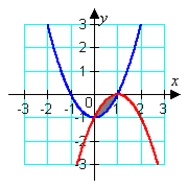
B) area = 1/6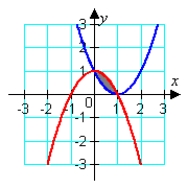
C) area = 1/3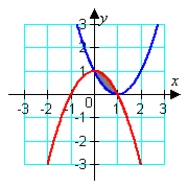
D) area = 1/3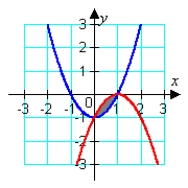

A) area = 5/3

B) area = 1/6

C) area = 1/3

D) area = 1/3


Unlock Deck
Unlock for access to all 113 flashcards in this deck.
Unlock Deck
k this deck
13
Identify the graph and area of the region bounded by the curves  . Use only one integral. The figures below are not necessarily to scale.
. Use only one integral. The figures below are not necessarily to scale.
A)
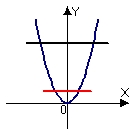
B)
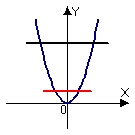
C)

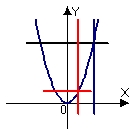
D)
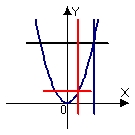
 . Use only one integral. The figures below are not necessarily to scale.
. Use only one integral. The figures below are not necessarily to scale.A)


B)


C)



D)



Unlock Deck
Unlock for access to all 113 flashcards in this deck.
Unlock Deck
k this deck
14
Estimate the intersection points to the nearest tenth then use these points to estimate the area. 

A) area
B) area
C) area
D) area


A) area

B) area

C) area

D) area


Unlock Deck
Unlock for access to all 113 flashcards in this deck.
Unlock Deck
k this deck
15
Given a certain amount of land potentially devoted to farming, one will first use the more fertile regions where production costs are lowest before using the less fertile regions. The consequence of this logical strategy is that the production costs increase as production increases. A certain landowner has enough land to produce 106 bushels of a particular crop, and the production costs, c, of the nth bushel is described with the equation  . If the market price is p for this particular crop, the profit for producing the nth bushel is
. If the market price is p for this particular crop, the profit for producing the nth bushel is  . If p = $5.50, how much total profit could the farmer expect to obtain by producing
. If p = $5.50, how much total profit could the farmer expect to obtain by producing  bushels.
bushels.
A) $668,400
B) $444,300
C) $600,000
D) $531,600
 . If the market price is p for this particular crop, the profit for producing the nth bushel is
. If the market price is p for this particular crop, the profit for producing the nth bushel is  . If p = $5.50, how much total profit could the farmer expect to obtain by producing
. If p = $5.50, how much total profit could the farmer expect to obtain by producing  bushels.
bushels.A) $668,400
B) $444,300
C) $600,000
D) $531,600

Unlock Deck
Unlock for access to all 113 flashcards in this deck.
Unlock Deck
k this deck
16
Find the area of the region bounded by the given curves. Write a single integral that represents the area. 

A) area
B) area
C) area
D) area


A) area

B) area

C) area

D) area


Unlock Deck
Unlock for access to all 113 flashcards in this deck.
Unlock Deck
k this deck
17
Identify the graph and area of the region bounded by the curves  . The figures below are not necessarily to scale.
. The figures below are not necessarily to scale.
A) area =
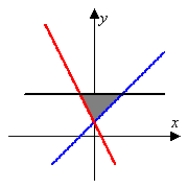
B) area =
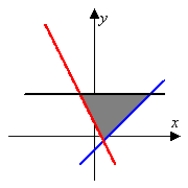
C) area =
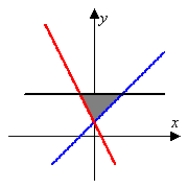
D) area =
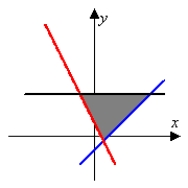
 . The figures below are not necessarily to scale.
. The figures below are not necessarily to scale.A) area =


B) area =


C) area =


D) area =



Unlock Deck
Unlock for access to all 113 flashcards in this deck.
Unlock Deck
k this deck
18
Identify the graph and the area of the region determined by the intersections of the tabulated curves using Simpson's Rule. 
A)
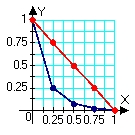
B)
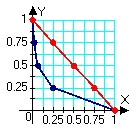
C)
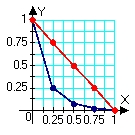
D)
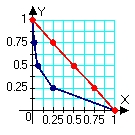

A)


B)


C)


D)



Unlock Deck
Unlock for access to all 113 flashcards in this deck.
Unlock Deck
k this deck
19
Identify the graph and area of the region bounded by the curves  . Use only one integral. The figures below are not necessarily to scale.
. Use only one integral. The figures below are not necessarily to scale.
A)
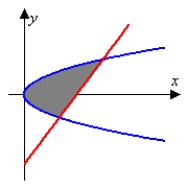
B)
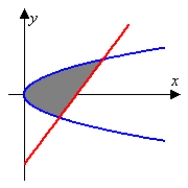
C)
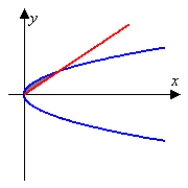
D)
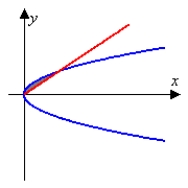
 . Use only one integral. The figures below are not necessarily to scale.
. Use only one integral. The figures below are not necessarily to scale.A)


B)


C)


D)



Unlock Deck
Unlock for access to all 113 flashcards in this deck.
Unlock Deck
k this deck
20
Identify the graph and the area bounded by the curves  on the interval
on the interval  .
.
A)
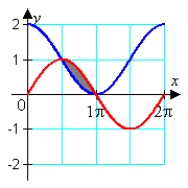
B)
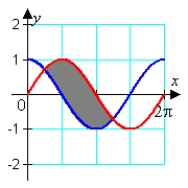
C)
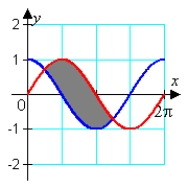
D)
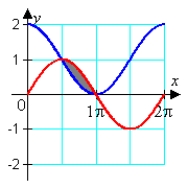
 on the interval
on the interval  .
.A)


B)


C)


D)



Unlock Deck
Unlock for access to all 113 flashcards in this deck.
Unlock Deck
k this deck
21
Find the volume of the solid formed by revolving the region bounded by  about x = 4.
about x = 4.
A)
B)
C)
D)
 about x = 4.
about x = 4.A)

B)

C)

D)


Unlock Deck
Unlock for access to all 113 flashcards in this deck.
Unlock Deck
k this deck
22
Find the volume of the solid with cross-sectional area  extending over the range
extending over the range  .
.
A)
B)
C)
D)
 extending over the range
extending over the range  .
.A)

B)

C)

D)


Unlock Deck
Unlock for access to all 113 flashcards in this deck.
Unlock Deck
k this deck
23
A 2-person tent has a rectangular base  and rises to a single point 5' up. Compute the volume of the tent.
and rises to a single point 5' up. Compute the volume of the tent. 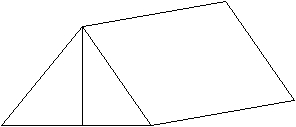 6 ft 7 ft
6 ft 7 ft
A) 65 ft3
B) 53 ft3
C) 105 ft3
D) 210 ft3
 and rises to a single point 5' up. Compute the volume of the tent.
and rises to a single point 5' up. Compute the volume of the tent.  6 ft 7 ft
6 ft 7 ftA) 65 ft3
B) 53 ft3
C) 105 ft3
D) 210 ft3

Unlock Deck
Unlock for access to all 113 flashcards in this deck.
Unlock Deck
k this deck
24
Find the volume of the solid formed by revolving the region bounded by  about y = 0.
about y = 0.
A)
B)
C)
D)
 about y = 0.
about y = 0.A)

B)

C)

D)


Unlock Deck
Unlock for access to all 113 flashcards in this deck.
Unlock Deck
k this deck
25
The base of a solid V is the region bounded by  and
and  Find the volume if V has square cross sections.
Find the volume if V has square cross sections.
A)
B)
C)
D)
 and
and  Find the volume if V has square cross sections.
Find the volume if V has square cross sections.A)

B)

C)

D)


Unlock Deck
Unlock for access to all 113 flashcards in this deck.
Unlock Deck
k this deck
26
A football (American) has a circular cross section with radius approximately  for
for  . Compute the volume of the football.
. Compute the volume of the football.
A) 238.9 inches3
B) 165.9 inches3
C) 119.4 inches3
D) 82.9 inches3
 for
for  . Compute the volume of the football.
. Compute the volume of the football.A) 238.9 inches3
B) 165.9 inches3
C) 119.4 inches3
D) 82.9 inches3

Unlock Deck
Unlock for access to all 113 flashcards in this deck.
Unlock Deck
k this deck
27
Let R be the region bounded by  . Compute the volume of the solid formed by revolving R about y = 15.
. Compute the volume of the solid formed by revolving R about y = 15.
A)

B)

C)

D)

 . Compute the volume of the solid formed by revolving R about y = 15.
. Compute the volume of the solid formed by revolving R about y = 15.A)


B)


C)


D)



Unlock Deck
Unlock for access to all 113 flashcards in this deck.
Unlock Deck
k this deck
28
Let R be the region bounded by  . Compute the volume of the solid formed by revolving R about x = 3.
. Compute the volume of the solid formed by revolving R about x = 3.
A)
B)
C)

D)
 . Compute the volume of the solid formed by revolving R about x = 3.
. Compute the volume of the solid formed by revolving R about x = 3.A)

B)

C)


D)


Unlock Deck
Unlock for access to all 113 flashcards in this deck.
Unlock Deck
k this deck
29
Compute the volume of a solid formed by revolving the region bounded by 
A)
B)
C)
D)

A)

B)

C)

D)


Unlock Deck
Unlock for access to all 113 flashcards in this deck.
Unlock Deck
k this deck
30
Use cylindrical shells to compute the volume of the solid formed by revolving the region bounded by  about x = 13.
about x = 13.
A)
B)
C)
D)
 about x = 13.
about x = 13.A)

B)

C)

D)


Unlock Deck
Unlock for access to all 113 flashcards in this deck.
Unlock Deck
k this deck
31
Find the volume of the solid formed by revolving the region bounded by  about x = 7.
about x = 7.
A)
B)
C)
D)
 about x = 7.
about x = 7.A)

B)

C)

D)


Unlock Deck
Unlock for access to all 113 flashcards in this deck.
Unlock Deck
k this deck
32
Compute the volume of the solid formed by revolving the region bounded by  and
and  about the x-axis.
about the x-axis.
A)
B)
C)
D)
 and
and  about the x-axis.
about the x-axis.A)

B)

C)

D)


Unlock Deck
Unlock for access to all 113 flashcards in this deck.
Unlock Deck
k this deck
33
Let R be the region bounded by  , the x-axis, and the y-axis. Compute the volume of the solid formed by revolving R about the y-axis.
, the x-axis, and the y-axis. Compute the volume of the solid formed by revolving R about the y-axis.
A)
B)
C)
D)
 , the x-axis, and the y-axis. Compute the volume of the solid formed by revolving R about the y-axis.
, the x-axis, and the y-axis. Compute the volume of the solid formed by revolving R about the y-axis.A)

B)

C)

D)


Unlock Deck
Unlock for access to all 113 flashcards in this deck.
Unlock Deck
k this deck
34
Compute the volume of a solid formed by revolving the region bounded by 
A)
B)
C)
D)

A)

B)

C)

D)


Unlock Deck
Unlock for access to all 113 flashcards in this deck.
Unlock Deck
k this deck
35
Use Simpson's Rule to estimate the volume of the shape obtained by revolving the cross-section given in the table about the y-axis. 
A) 43
B) 268
C) 3899
D) 421

A) 43
B) 268
C) 3899
D) 421

Unlock Deck
Unlock for access to all 113 flashcards in this deck.
Unlock Deck
k this deck
36
Show that the volume of a solid formed by revolving the region bounded by x = y2 and x = r about x = r is  .
.
 .
.
Unlock Deck
Unlock for access to all 113 flashcards in this deck.
Unlock Deck
k this deck
37
Use Simpson's rule to estimate the volume from the given cross sectional areas. 
A) 3.3
B) 4.0
C) 12.0
D) 6.0

A) 3.3
B) 4.0
C) 12.0
D) 6.0

Unlock Deck
Unlock for access to all 113 flashcards in this deck.
Unlock Deck
k this deck
38
Sketch the solid bounded by  and the x-axis on the interval
and the x-axis on the interval  revolved about the line
revolved about the line  Draw a typical shell and write an integral that can be used to compute the volume of the solid.
Draw a typical shell and write an integral that can be used to compute the volume of the solid.
 and the x-axis on the interval
and the x-axis on the interval  revolved about the line
revolved about the line  Draw a typical shell and write an integral that can be used to compute the volume of the solid.
Draw a typical shell and write an integral that can be used to compute the volume of the solid.
Unlock Deck
Unlock for access to all 113 flashcards in this deck.
Unlock Deck
k this deck
39
Let R be the region bounded by  , the x-axis, and the y-axis. Compute the volume of the solid formed by revolving R about the x-axis.
, the x-axis, and the y-axis. Compute the volume of the solid formed by revolving R about the x-axis.
A)
B)
C)
D)
 , the x-axis, and the y-axis. Compute the volume of the solid formed by revolving R about the x-axis.
, the x-axis, and the y-axis. Compute the volume of the solid formed by revolving R about the x-axis.A)

B)

C)

D)


Unlock Deck
Unlock for access to all 113 flashcards in this deck.
Unlock Deck
k this deck
40
The base of a solid V is the region bounded by  and
and  Find the volume if V has semicircular cross sections perpendicular to the x-axis.
Find the volume if V has semicircular cross sections perpendicular to the x-axis.
A)
B)
C)
D)
 and
and  Find the volume if V has semicircular cross sections perpendicular to the x-axis.
Find the volume if V has semicircular cross sections perpendicular to the x-axis.A)

B)

C)

D)


Unlock Deck
Unlock for access to all 113 flashcards in this deck.
Unlock Deck
k this deck
41
A solid shape described as the region bounded by  revolved around the y-axis, needs to have 1/4 of its volume trimmed off to meet a weight restriction. This will be done by reducing the radius of the piece - in other words, the resulting shape will be described as above, but with the region also bounded by x = q. Find the resulting radius, q.
revolved around the y-axis, needs to have 1/4 of its volume trimmed off to meet a weight restriction. This will be done by reducing the radius of the piece - in other words, the resulting shape will be described as above, but with the region also bounded by x = q. Find the resulting radius, q.
A)
B)
C)
D)
 revolved around the y-axis, needs to have 1/4 of its volume trimmed off to meet a weight restriction. This will be done by reducing the radius of the piece - in other words, the resulting shape will be described as above, but with the region also bounded by x = q. Find the resulting radius, q.
revolved around the y-axis, needs to have 1/4 of its volume trimmed off to meet a weight restriction. This will be done by reducing the radius of the piece - in other words, the resulting shape will be described as above, but with the region also bounded by x = q. Find the resulting radius, q.A)

B)

C)

D)


Unlock Deck
Unlock for access to all 113 flashcards in this deck.
Unlock Deck
k this deck
42
Identify the region (solid lines) and axis of revolution (dashed line) for the solid whose volume is described by the integral  .
.
A)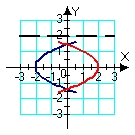
B)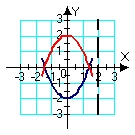
C)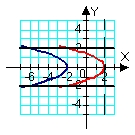
D)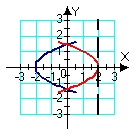
 .
.A)

B)

C)

D)


Unlock Deck
Unlock for access to all 113 flashcards in this deck.
Unlock Deck
k this deck
43
Pick the integral that represents a volume calculation by cylindrical shells that is equivalent to the following integral that represents a calculation of the same volume but by the method of washers. 
A)
B)
C)
D)

A)

B)

C)

D)


Unlock Deck
Unlock for access to all 113 flashcards in this deck.
Unlock Deck
k this deck
44
Use two straight line segments to estimate the length of the line segment described by the function  from
from  . Choose x = 0 as the middle point.
. Choose x = 0 as the middle point.
A) 3.02
B) 3.07
C) 3.12
D) 3.17
 from
from  . Choose x = 0 as the middle point.
. Choose x = 0 as the middle point.A) 3.02
B) 3.07
C) 3.12
D) 3.17

Unlock Deck
Unlock for access to all 113 flashcards in this deck.
Unlock Deck
k this deck
45
Find the length of the line segment described by the function of  from
from  . Round your answer to three decimal places.
. Round your answer to three decimal places.
A) 55.07
B) 55.12
C) 55.17
D) 55.22
 from
from  . Round your answer to three decimal places.
. Round your answer to three decimal places.A) 55.07
B) 55.12
C) 55.17
D) 55.22

Unlock Deck
Unlock for access to all 113 flashcards in this deck.
Unlock Deck
k this deck
46
Compute the arc length exactly. 
A)
B)
C)
D)

A)

B)

C)

D)


Unlock Deck
Unlock for access to all 113 flashcards in this deck.
Unlock Deck
k this deck
47
Use cylindrical shells to compute the volume of the solid formed by revolving the region bounded by  about y = 10.
about y = 10.
A)
B)
C)
D)
 about y = 10.
about y = 10.A)

B)

C)

D)


Unlock Deck
Unlock for access to all 113 flashcards in this deck.
Unlock Deck
k this deck
48
Use the best method available to find the volume of the solid formed by revolving the region bounded by the y-axis, 
 and
and  about the y-axis. Write the integral that is used to find the volume.
about the y-axis. Write the integral that is used to find the volume.

 and
and  about the y-axis. Write the integral that is used to find the volume.
about the y-axis. Write the integral that is used to find the volume.
Unlock Deck
Unlock for access to all 113 flashcards in this deck.
Unlock Deck
k this deck
49
Compute the arc length exactly. 
A)
B)
C)
D)

A)

B)

C)

D)


Unlock Deck
Unlock for access to all 113 flashcards in this deck.
Unlock Deck
k this deck
50
Set up the integral for arc length and then approximate the integral with a numerical method. Round answers to four decimal places. 


Unlock Deck
Unlock for access to all 113 flashcards in this deck.
Unlock Deck
k this deck
51
Find the volume of the solid formed by revolving the region bounded by  about y = 6.
about y = 6.
A)
B)
C)
D)
 about y = 6.
about y = 6.A)

B)

C)

D)


Unlock Deck
Unlock for access to all 113 flashcards in this deck.
Unlock Deck
k this deck
52
Find the length of the curve defined by function  and extending from x = 0 to x = 2. Round your answer to three decimal places.
and extending from x = 0 to x = 2. Round your answer to three decimal places.
A) 4.712
B) 4.812
C) 4.912
D) 5.012
 and extending from x = 0 to x = 2. Round your answer to three decimal places.
and extending from x = 0 to x = 2. Round your answer to three decimal places.A) 4.712
B) 4.812
C) 4.912
D) 5.012

Unlock Deck
Unlock for access to all 113 flashcards in this deck.
Unlock Deck
k this deck
53
Find the length of the line segment described by the function  between x = 1 and x = 4. Round your answer to three decimal places.
between x = 1 and x = 4. Round your answer to three decimal places.
A) 3.550
B) 3.350
C) 3.15
D) 2.950
 between x = 1 and x = 4. Round your answer to three decimal places.
between x = 1 and x = 4. Round your answer to three decimal places.A) 3.550
B) 3.350
C) 3.15
D) 2.950

Unlock Deck
Unlock for access to all 113 flashcards in this deck.
Unlock Deck
k this deck
54
An anthill is in the shape formed by revolving the region bounded by  and the x-axis about the y-axis. A researcher removes a cylindrical core from the center of the hill. What should the radius be to give the researcher 15% of the dirt?
and the x-axis about the y-axis. A researcher removes a cylindrical core from the center of the hill. What should the radius be to give the researcher 15% of the dirt?
A) 0.7206
B) 0.4412
C) 0.2794
D) 0.5588
 and the x-axis about the y-axis. A researcher removes a cylindrical core from the center of the hill. What should the radius be to give the researcher 15% of the dirt?
and the x-axis about the y-axis. A researcher removes a cylindrical core from the center of the hill. What should the radius be to give the researcher 15% of the dirt?A) 0.7206
B) 0.4412
C) 0.2794
D) 0.5588

Unlock Deck
Unlock for access to all 113 flashcards in this deck.
Unlock Deck
k this deck
55
Use the best method available to find the volume of the solid formed by revolving the region bounded by 
 and
and  about the y-axis. Write the integral that is used to find the volume.
about the y-axis. Write the integral that is used to find the volume.

 and
and  about the y-axis. Write the integral that is used to find the volume.
about the y-axis. Write the integral that is used to find the volume.
Unlock Deck
Unlock for access to all 113 flashcards in this deck.
Unlock Deck
k this deck
56
Use the best method available to find the volume of the solid formed by revolving the region bounded by  and
and  about the x-axis. Write the integral that is used to find the volume.
about the x-axis. Write the integral that is used to find the volume.
A)
B)
C)
D)
 and
and  about the x-axis. Write the integral that is used to find the volume.
about the x-axis. Write the integral that is used to find the volume.A)

B)

C)

D)


Unlock Deck
Unlock for access to all 113 flashcards in this deck.
Unlock Deck
k this deck
57
Identify the region (solid lines) and axis of revolution (dashed line) for the solid whose volume is described by the integral  .
.
A)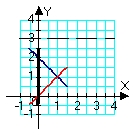
B)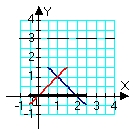
C)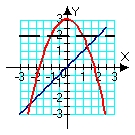
D)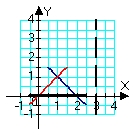
 .
.A)

B)

C)

D)


Unlock Deck
Unlock for access to all 113 flashcards in this deck.
Unlock Deck
k this deck
58
A person 6' tall wants to buy a jump rope. If , when the rope is at its lowest point, his hands will be 2' apart and 3' above the ground, and if the rope will take on the shape of a parabola just barely hitting the ground, how long must the rope be? [Consider the form of the rope to be described by the equation ![<strong>A person 6' tall wants to buy a jump rope. If , when the rope is at its lowest point, his hands will be 2' apart and 3' above the ground, and if the rope will take on the shape of a parabola just barely hitting the ground, how long must the rope be? [Consider the form of the rope to be described by the equation , with the origin being a spot on the ground underneath the jumper.]</strong> A) 6.75 feet B) 6.50 feet C) 6.25 feet D) 6.00 feet](https://storage.examlex.com/TB2342/11eaa948_cd07_0488_84bc_ab64d22e93c9_TB2342_11.jpg) , with the origin being a spot on the ground underneath the jumper.]
, with the origin being a spot on the ground underneath the jumper.]
A) 6.75 feet
B) 6.50 feet
C) 6.25 feet
D) 6.00 feet
![<strong>A person 6' tall wants to buy a jump rope. If , when the rope is at its lowest point, his hands will be 2' apart and 3' above the ground, and if the rope will take on the shape of a parabola just barely hitting the ground, how long must the rope be? [Consider the form of the rope to be described by the equation , with the origin being a spot on the ground underneath the jumper.]</strong> A) 6.75 feet B) 6.50 feet C) 6.25 feet D) 6.00 feet](https://storage.examlex.com/TB2342/11eaa948_cd07_0488_84bc_ab64d22e93c9_TB2342_11.jpg) , with the origin being a spot on the ground underneath the jumper.]
, with the origin being a spot on the ground underneath the jumper.]A) 6.75 feet
B) 6.50 feet
C) 6.25 feet
D) 6.00 feet

Unlock Deck
Unlock for access to all 113 flashcards in this deck.
Unlock Deck
k this deck
59
Use the best method available to find the volume of the solid formed by revolving the region bounded by 
 and
and  about the x-axis. Write the integral that is used to find the volume.
about the x-axis. Write the integral that is used to find the volume.

 and
and  about the x-axis. Write the integral that is used to find the volume.
about the x-axis. Write the integral that is used to find the volume.
Unlock Deck
Unlock for access to all 113 flashcards in this deck.
Unlock Deck
k this deck
60
Use cylindrical shells to compute the volume of the solid formed by revolving the region bounded by  about x = 5.
about x = 5.
A)
B)
C)
D)
 about x = 5.
about x = 5.A)

B)

C)

D)


Unlock Deck
Unlock for access to all 113 flashcards in this deck.
Unlock Deck
k this deck
61
Identify the integral used to determine the surface area of the surface of revolution for the shape described by  ,
,  , revolved about the x-axis.
, revolved about the x-axis.
A)
B)
C)
D)
 ,
,  , revolved about the x-axis.
, revolved about the x-axis.A)

B)

C)

D)


Unlock Deck
Unlock for access to all 113 flashcards in this deck.
Unlock Deck
k this deck
62
A baseball pitcher releases the ball horizontally from a height of 5 ft with an initial speed of 140 ft/s. Find the height of the ball when it reaches home plate 60 feet away. Round to two decimal places. (Hint: Determine the time of flight from the x-equation, then use the y-equation to determine the height.)
A) 2.33 ft
B) 2.06 ft
C) 3.67 ft
D) 2.67 ft
A) 2.33 ft
B) 2.06 ft
C) 3.67 ft
D) 2.67 ft

Unlock Deck
Unlock for access to all 113 flashcards in this deck.
Unlock Deck
k this deck
63
When a certain spring is stretched 0.10 m, 4  of work is done. What is the spring's "spring constant"?
of work is done. What is the spring's "spring constant"?
A) 800.0 N/m
B) 400.0 N/m
C) 40.0 N/m
D) 20.0 N/m
 of work is done. What is the spring's "spring constant"?
of work is done. What is the spring's "spring constant"?A) 800.0 N/m
B) 400.0 N/m
C) 40.0 N/m
D) 20.0 N/m

Unlock Deck
Unlock for access to all 113 flashcards in this deck.
Unlock Deck
k this deck
64
In a baseball game a base-runner can attempt to advance when a fielder catches a hit ball before it reaches the ground, so long as the runner doesn't leave base before the fielder catches the ball. The fielder then attempts to throw the ball to the base ahead of the runner. If a base-runner can run from 3rd base to home plate in 4.0 sec, how fast must the centerfielder's throw leave his hand if he makes the catch then immediately throws the ball 350 ft from home plate? Assume the base-runner leaves his base at the same instant the centerfielder throws the ball, and that the ball reaches the catcher standing over home plate at the same height from which it was thrown and at the same time the runner would reach the plate. [Hint: This is basically a problem of determining how much initial vertical velocity the ball needs to stay in the air long enough to reach the plate.]
A) 88 ft/sec
B) 64 ft/sec
C) 108 ft/sec
D) 152 ft/sec
A) 88 ft/sec
B) 64 ft/sec
C) 108 ft/sec
D) 152 ft/sec

Unlock Deck
Unlock for access to all 113 flashcards in this deck.
Unlock Deck
k this deck
65
An object propelled from the ground with an initial velocity of 50 ft/s will reach a maximum height of 39.1 ft. If the initial velocity is increased 18%, by what percentage will the maximum height increase? Round percentages to the nearest integer.
A) 18%
B) 39%
C) 3%
D) 28%
A) 18%
B) 39%
C) 3%
D) 28%

Unlock Deck
Unlock for access to all 113 flashcards in this deck.
Unlock Deck
k this deck
66
Set up the integral for the surface area of the surface of revolution and approximate the integral with a numerical method. Round answers to two decimal places.  revolved about the x-axis
revolved about the x-axis
A)
B)
C)
D)
 revolved about the x-axis
revolved about the x-axisA)

B)

C)

D)


Unlock Deck
Unlock for access to all 113 flashcards in this deck.
Unlock Deck
k this deck
67
What is the minimum speed a ball must be thrown upward if it is to reach a height of 11 feet?
A) 11 ft/s
B) ft/s
ft/s
C) ft/s
ft/s
D) 0 ft/s
A) 11 ft/s
B)
 ft/s
ft/sC)
 ft/s
ft/sD) 0 ft/s

Unlock Deck
Unlock for access to all 113 flashcards in this deck.
Unlock Deck
k this deck
68
A ball is thrown at an angle of ![<strong>A ball is thrown at an angle of with an initial speed of 40 meters/second. What is its time of flight ? [Assume the ball is thrown from ground level and lands at ground level.]</strong> A) 0.14 seconds B) 5.00 seconds C) 1.77 seconds D) 5.77 seconds](https://storage.examlex.com/TB2342/11eaa948_cd08_b25f_84bc_5b58423fbb40_TB2342_11.jpg) with an initial speed of 40 meters/second. What is its time of flight ? [Assume the ball is thrown from ground level and lands at ground level.]
with an initial speed of 40 meters/second. What is its time of flight ? [Assume the ball is thrown from ground level and lands at ground level.]
A) 0.14 seconds
B) 5.00 seconds
C) 1.77 seconds
D) 5.77 seconds
![<strong>A ball is thrown at an angle of with an initial speed of 40 meters/second. What is its time of flight ? [Assume the ball is thrown from ground level and lands at ground level.]</strong> A) 0.14 seconds B) 5.00 seconds C) 1.77 seconds D) 5.77 seconds](https://storage.examlex.com/TB2342/11eaa948_cd08_b25f_84bc_5b58423fbb40_TB2342_11.jpg) with an initial speed of 40 meters/second. What is its time of flight ? [Assume the ball is thrown from ground level and lands at ground level.]
with an initial speed of 40 meters/second. What is its time of flight ? [Assume the ball is thrown from ground level and lands at ground level.]A) 0.14 seconds
B) 5.00 seconds
C) 1.77 seconds
D) 5.77 seconds

Unlock Deck
Unlock for access to all 113 flashcards in this deck.
Unlock Deck
k this deck
69
In a movie stunt, a car is driven off a cliff and falls into the ocean 200 feet below. If the car is going 50 feet/second (horizontally) when it goes over the cliff, its horizontal position is described as x = 50 t, where t is the time in seconds. Its vertical position is described as y = 16 t2, where y is the distance below the cliff (i.e. y = 200 when the car hits the ocean). Compute the length of the path traversed by the falling car. Round to the nearest foot. [Hint: The two equations will need to be combined, eliminating t so that y is expressed as a function of x.]
A) 274 feet
B) 279 feet
C) 284 feet
D) 289 feet
A) 274 feet
B) 279 feet
C) 284 feet
D) 289 feet

Unlock Deck
Unlock for access to all 113 flashcards in this deck.
Unlock Deck
k this deck
70
Identify the integral used to determine the surface area of the surface of revolution for the shape described by  ,
,  , revolved about the x-axis.
, revolved about the x-axis.
A)
B)
C)
D)
 ,
,  , revolved about the x-axis.
, revolved about the x-axis.A)

B)

C)

D)


Unlock Deck
Unlock for access to all 113 flashcards in this deck.
Unlock Deck
k this deck
71
Two divers, one on the 15 ft platform and one on the 30 ft platform, hope to perform a joint dive in which they enter the water at the same time. If each begins with an upward jump with an initial velocity of at 14 ft/s, how much time difference should there be between the start of the two dives?
A) 0.43 s
B) 30.00 s
C) 0.38 s
D) 0.75 s
A) 0.43 s
B) 30.00 s
C) 0.38 s
D) 0.75 s

Unlock Deck
Unlock for access to all 113 flashcards in this deck.
Unlock Deck
k this deck
72
An object is dropped from a height of 100 feet. Another object directly below the first is launched vertically from the ground with an initial velocity of 50 ft/s. Determine when and how high up the objects collide.

Unlock Deck
Unlock for access to all 113 flashcards in this deck.
Unlock Deck
k this deck
73
A race track is described by the equations  , and
, and  . How long is one lap around the track? Round your answer to the nearest tenth.
. How long is one lap around the track? Round your answer to the nearest tenth.
A) 16.6
B) 5.5
C) 33.1
D) 303.8
 , and
, and  . How long is one lap around the track? Round your answer to the nearest tenth.
. How long is one lap around the track? Round your answer to the nearest tenth.A) 16.6
B) 5.5
C) 33.1
D) 303.8

Unlock Deck
Unlock for access to all 113 flashcards in this deck.
Unlock Deck
k this deck
74
Set up the integral for the surface area of the surface of revolution and approximate the integral with a numerical method. Round answers to two decimal places.  revolved about the x-axis
revolved about the x-axis
A)
B)
C)
D)
 revolved about the x-axis
revolved about the x-axisA)

B)

C)

D)


Unlock Deck
Unlock for access to all 113 flashcards in this deck.
Unlock Deck
k this deck
75
A projectile passes overhead, and you attempt to shoot it down with a cannon. When it passes overhead it is traveling horizontally at 100 m/s at an elevation of 1500 m. Your cannon launches shells at 200 m/s, and in this instance you fire just as the projectile passes overhead and at an angle of 60o. In this scenario the horizontal velocities of the two projectiles are the same. At what elevation will the cannon shell and the other projectile collide?
A) They won't collide before the cannon shell hits the ground.
B) 1457.6 m
C) 1224.4 m
D) 1132.5 m
A) They won't collide before the cannon shell hits the ground.
B) 1457.6 m
C) 1224.4 m
D) 1132.5 m

Unlock Deck
Unlock for access to all 113 flashcards in this deck.
Unlock Deck
k this deck
76
Identify the initial conditions y(0) and y'(0) for the vertical motion of an object , if the object thrown downward at a velocity of 6 feet per second from a height of 30 feet. [Take the origin to be on the ground.]
A) y(0) = 30, y'(0) = -6
B) y(0) = 0, y'(0) = -6
C) y(0) = 30, y'(0) = 6
D) y(0) = 0, y'(0) = 6
A) y(0) = 30, y'(0) = -6
B) y(0) = 0, y'(0) = -6
C) y(0) = 30, y'(0) = 6
D) y(0) = 0, y'(0) = 6

Unlock Deck
Unlock for access to all 113 flashcards in this deck.
Unlock Deck
k this deck
77
Identify the integral used to determine the surface area of the surface of revolution for the shape described by  ,
,  , revolved about the x-axis.
, revolved about the x-axis.
A)
B)
C)
D)
 ,
,  , revolved about the x-axis.
, revolved about the x-axis.A)

B)

C)

D)


Unlock Deck
Unlock for access to all 113 flashcards in this deck.
Unlock Deck
k this deck
78
A 0.5 kg rock is dropped from the edge of a 17-foot cliff. How fast will it be going when it hits the ground at the base of the cliff?
A) ft/s
ft/s
B) ft/s
ft/s
C) 17 ft/s
D) ft/s
ft/s
A)
 ft/s
ft/sB)
 ft/s
ft/sC) 17 ft/s
D)
 ft/s
ft/s
Unlock Deck
Unlock for access to all 113 flashcards in this deck.
Unlock Deck
k this deck
79
Molding is typically long, thin, decorative pieces of wood used, for instance, around windows or doors. The cross-section of a particular type of molding can be described as the region bounded by  , x = 4, x = 0, and
, x = 4, x = 0, and  (all measured in inches), projected perpendicular to the xy-plane (see figure). If the manufacturer paints all four sides (but not the ends) and each gallon of paint covers 250 ft2, how many linear feet of molding can be coated with one gallon?
(all measured in inches), projected perpendicular to the xy-plane (see figure). If the manufacturer paints all four sides (but not the ends) and each gallon of paint covers 250 ft2, how many linear feet of molding can be coated with one gallon? 
A) 315.8 feet
B) 264.2 feet
C) 512.4 feet
D) 128.1 feet
 , x = 4, x = 0, and
, x = 4, x = 0, and  (all measured in inches), projected perpendicular to the xy-plane (see figure). If the manufacturer paints all four sides (but not the ends) and each gallon of paint covers 250 ft2, how many linear feet of molding can be coated with one gallon?
(all measured in inches), projected perpendicular to the xy-plane (see figure). If the manufacturer paints all four sides (but not the ends) and each gallon of paint covers 250 ft2, how many linear feet of molding can be coated with one gallon? 
A) 315.8 feet
B) 264.2 feet
C) 512.4 feet
D) 128.1 feet

Unlock Deck
Unlock for access to all 113 flashcards in this deck.
Unlock Deck
k this deck
80
Identify the initial conditions y(0) and y'(0) for the vertical motion of an object, if the object is dropped from a height of 40 feet. [Take the origin to be on the ground.]
A) y(0) = 0, y'(0) = 0
B) y(0) = 40, y'(0) = 40t
C) y(0) = 0, y'(0) = -40
D) y(0) = 40, y'(0) = 0
A) y(0) = 0, y'(0) = 0
B) y(0) = 40, y'(0) = 40t
C) y(0) = 0, y'(0) = -40
D) y(0) = 40, y'(0) = 0

Unlock Deck
Unlock for access to all 113 flashcards in this deck.
Unlock Deck
k this deck


